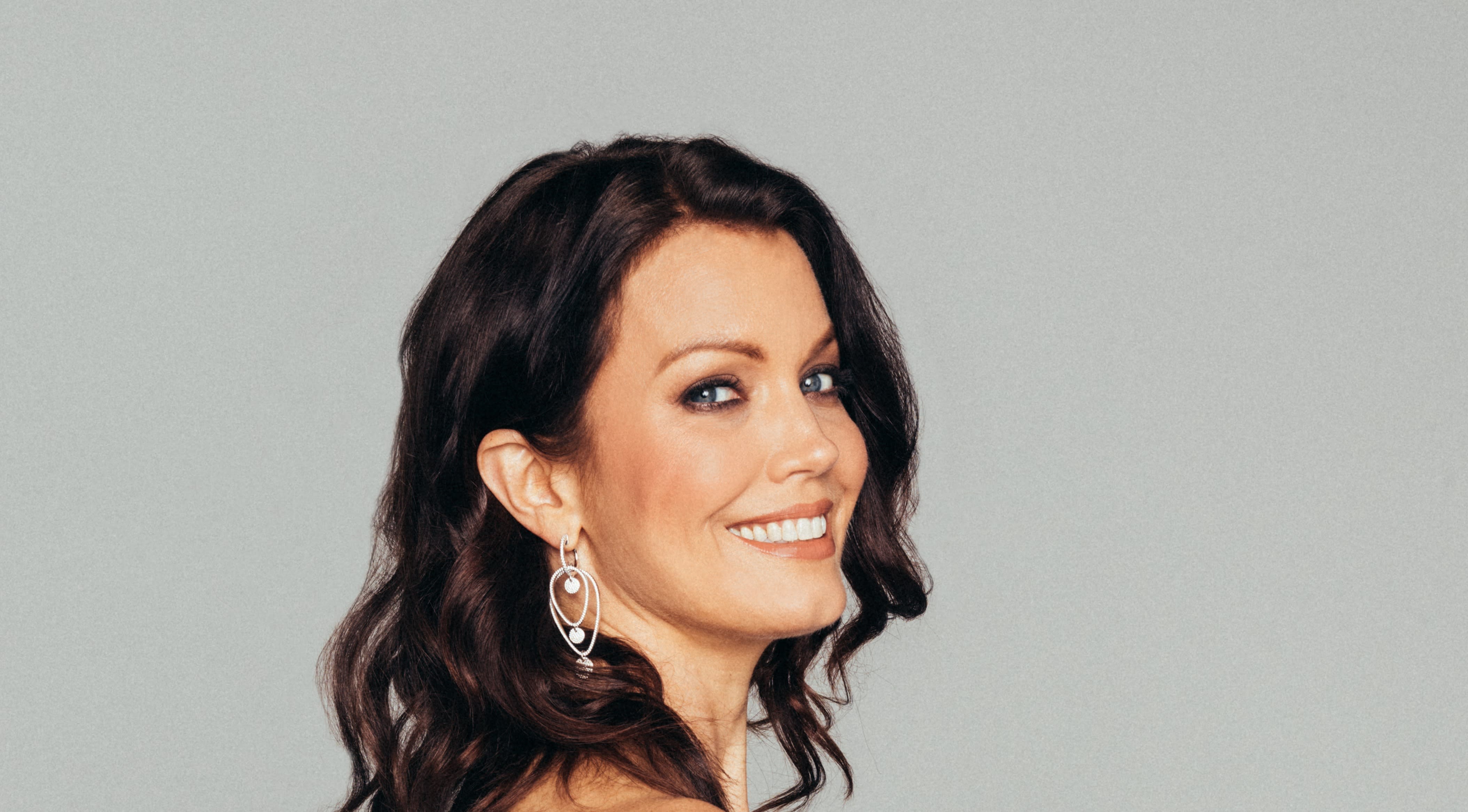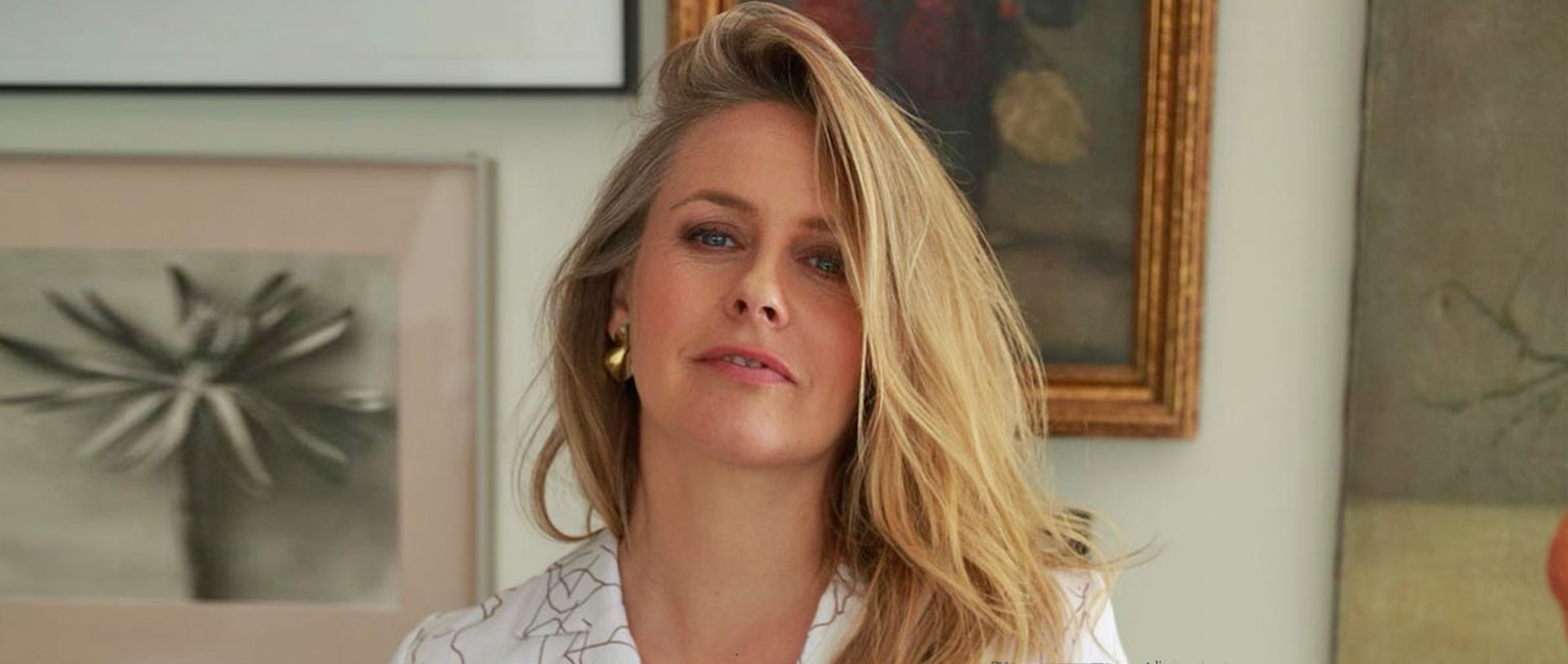




We sat down with actress and activist Alexandra Paul for a conversation about animal personhood, plant-based eating, and the power of policy change.

“I do feel like one person can change the world.”
In the presence of Alexandra Paul, it’s easy to believe that, too. The accomplished activist, actress, and athlete has dedicated much of her life to fighting for a better world. And her intersectional activism—which covers issues from animal rights to world peace—proves that you don’t have to pick just one battle.
Alexandra joined us for a conversation as rich and varied as her own advocacy, spanning topics from our culture’s anthropocentrism to the power of policy change.
You’ve been a prominent animal activist for years. What is your “why” that has pushed you to advocate for animals for so much of your life?
I first became conscious of animal rights when I became a vegetarian at 14, and then when I read Peter Singer’s book Animal Liberation at 15 or so for a book report. The reason I initially became vegetarian was for environmental reasons, so that was my “why” back then.
Later, I became more conscious of what products were tested on animals and the suffering of animals that was associated with what I did. So that became my second “why.” And that has always been my guiding principle. Although I host the podcast Switch4Good about all the health reasons to go plant-based, I have always been a person who chose to not eat animals—and to eliminate all animal products from my diet—because of the suffering that they incur.
Beyond animals, you also advocate for a wide array of causes: for peace, environmental protection, human rights, and so much more. Can you speak to the intersectionality of these other issues with the animal protection movement?
Oh, yes, I can! I believe that animals should be seen as persons in the eyes of the law. That colors everything. That changes everything about how animals should be living on a day-to-day basis, and how they should be cared for by their human guardians. I believe they shouldn’t be tested on, shouldn’t be used for food, and shouldn’t be used for humans at all.
That dovetails with my feelings about human rights. Autonomy is so important, and humans should have the right to choose their destiny and the way they live without being oppressed.
And, of course, my concern for the environment also links in. I believe that humans are not the center of the planet. With every action we take, we need to be thinking not only seven generations of humans from now, but seven generations of every species on the planet from now.
I think people just haven’t gotten their heads wrapped around it yet. We’re so anthropocentric that we cannot see beyond what the earth—and everything on it—can give to us.
For me, that mindset shift came with going vegan. Before that, I just didn't see it. But when I became vegan, the scales fell from my eyes, and I saw injustices everywhere, for all species, and my part in that.
On your popular Switch4Good podcast, you have conversations about plant-based eating and so many other topics. What do you hope listeners will take away from these conversations?
I hope to inspire the audience to—yes, improve their health by eating more healthy foods, but also to improve their spiritual outlook by choosing not to harm animals with their diet. And to feel better about themselves! Because with every choice they make, they can feel empowered to have a positive effect on the world.
We have animal rights activists on the podcast, we have dieticians, we have spiritualists who talk about the bigger picture, and we have environmentalists. It’s quite holistic, because that's really what health is. It’s not just how much you weigh or what your blood lipids are. It's your whole outlook and how you live day to day. So I hope that the experts (my co-host) Dotsie and I interview can expand the way listeners look at the world—so we can all become better people.
On the subject of health, you’re an accomplished athlete and health coach. Your life is a testament to the power of a plant-based diet! Can you speak about your passion for plant-powered living?
When I do athletic races—like swimming 14 miles, or doing the IronMan triathlon, I hope that it shows people that they don't have to eat meat or drink milk to perform these things and to be healthy. There was an old view that people who were vegetarian or vegan were “wan, weak” people. That is belied by the fact that there are so many successful athletes—including my co-host, Dotsie Bausch, who won a silver medal at the Olympics in track cycling while on a vegan diet. People who are vegan can do extraordinary things with their bodies!
You’ve personally rescued chickens, who are some of the most abused animals in the world. What do you wish people knew about chickens?
Of course, I always knew intellectually that chickens had rights and that they shouldn’t suffer. But until I met chickens on a one-to-one basis, I sort of viewed them as a mass of white clucking things! Because when you look at a barn of chickens, it’s similar to when you look at humans walking along the streets of New York—they’re this crowd of people and we don’t see them as individuals. That’s the mistake we can make with chickens (who normally are not crowded into a big barn, anyway; it’s only because we humans have put them there!). We have made chickens into anonymous beings by the way we treat them.
When I rescued a chicken from a southern California farm, four years ago, I had her in my home for several days before she went to a sanctuary. And she was amazing. She had a personality! And I recognized that. Anybody who spends time with a chicken will see that they're an individual, just like your cat or dog, or like us humans.
“Anybody who spends time with a chicken will see that they're an individual, just like your cat or dog.”
I’m 60, so I grew up in the 60s and 70s and 80s when people thought that animals didn’t have feelings, didn’t have personalities, didn't even suffer pain. Or that if they did feel pain, it was less pain than humans would suffer in the same conditions. And now, luckily, we’re all recognizing that that’s not true. Science has shown us that it’s not true.
Our anthropocentrism tells us that we’re the best, and that we feel everything more than other species. I find it so interesting that even though cheetahs can run so much faster than us, dogs can smell better than us, birds can fly, we just figure we’re the smartest of everybody. It’s hilarious, isn’t it?
By the way, when I rescued that chicken, the prosecutors offered us five deals. They really didn’t want to go to trial. I guess they could have dropped the charges completely, which I wouldn’t have wanted. But I feel it’s so important that we go to court for animals, because animals need to have standing in court. Right now, only humans have standing—so we have to be proxies.
We haven’t gotten to personhood in courts yet, but we will. I loved it when I was sitting at the defense table and I’d look up to see six people in suits, all crowded around talking really enthusiastically and passionately… and I’d think, That is for two chickens. That is amazing.
It’s so important that we bring animal cases to the courts so that animals can have standing. Until they do, humans will have to pay the price. But it’s such a small price compared to what animals go through.
Looking back at your activism over the years, I imagine it took a lot of courage. Can you speak to the power of courage in changing the status quo?
I don’t feel like I have courage. I have a lot of privilege to be able to do this. As a white woman, I'm not afraid of the police. They have always treated me well. I’m not afraid of jail; I’ve always been treated with respect in jail. And I think that comes with being white, being middle class, and probably with my position as an actress. As an actor, I don’t have to worry about my work. No one has ever said they wouldn’t hire me because of my activism. For a lot of people—a teacher or a nurse, for example—you could be fired for the types of actions that I’ve done.
I'm also very fortunate to have a partner who will take care of my cats and help with things if I do go to jail for any period of time, or if I'm away on an investigation. So I’m really lucky to be able to do it. And because of that, I feel like I should do it. There are so many people who would want to take action for animals, but can’t, because of their life circumstances. That’s why I’ve always chosen actions that are on the end of the spectrum, rather than moderate. Simply because I’m able to.
What are your hopes for the future of our food system—and our planet?
I hope we survive. I know that sounds dramatic, but it’s true. I’m grateful that I’m not being born into this world, because I'm so concerned about the accelerating effects of climate change. It's snowballing, and it’s happening faster than anyone could have predicted 10 years ago. For developed countries it felt like climate change was still a future threat, but it was definitely being felt in developing countries. And now we see that it’s everywhere, and it’s hitting all of us.
So I'm concerned. But I still believe that—even though I don’t have an incredibly optimistic view—I still think that we have to do the right thing. That's what gets me up every morning. I do feel like one person can change the world. Which is maybe self-aggrandizing, but I really do believe that.
What I hope for is that humans recognize we have to curb our own fertility to be able to share the world with all these other species. We’re so quick to say that other animals are overpopulated, but never ourselves. The planet’s population has more than doubled in my lifetime—and it’s quadrupled in my mother’s lifetime. She’s 87. It’s quadrupled. So that is my first wish, because I feel like we can’t get anything else done unless we stabilize our population.
And then I would like to see people start eating plants, and not animals. That will probably come because of necessity—we won't be able to waste land on animal feed anymore, because it’s so inefficient to use land that way. Innovations in these alternative and cultured meats will become cheaper than having to raise animals themselves.
I also believe that we need to transition to a fossil-fuel-free economy. I’ve been involved with electric cars for a long time, and I started driving my first electric car 34 years ago. But, of course, it’s not just the transportation sector. Agriculture uses so many fossil fuels that if we can transform agriculture and how we eat, that would be huge.
So that’s what I hope for. If we can do those things, I think we can do so much.
You can keep up with Alexandra Paul on her award-winning podcast, Switch4Good. And join her—along with thousands of activists around the globe—in taking action for animals on the Fast Action Network. Ready to create the compassionate future we imagine?





